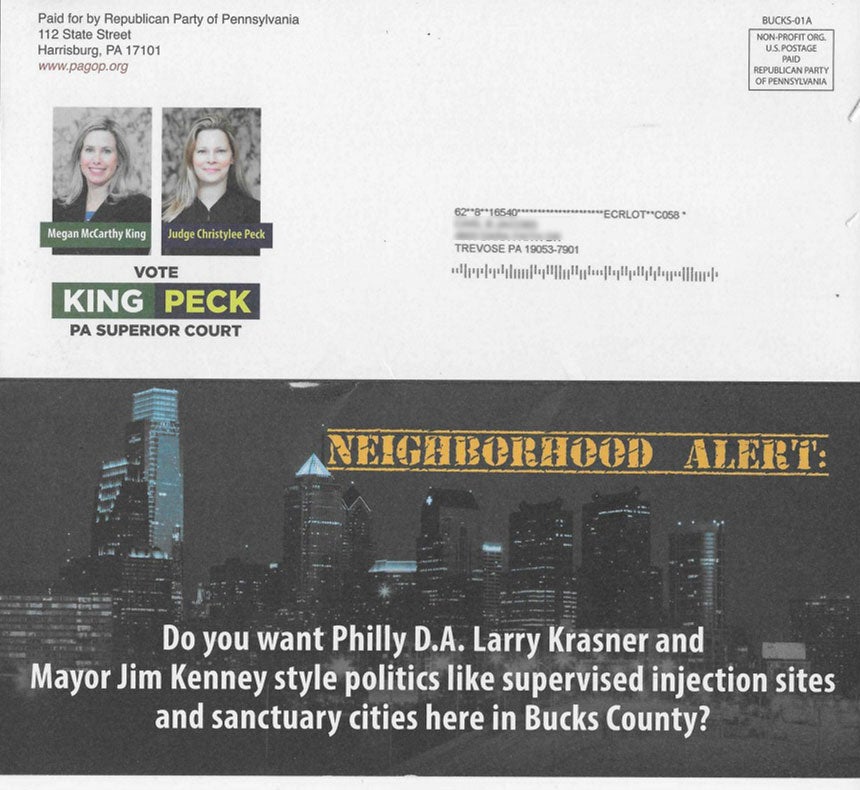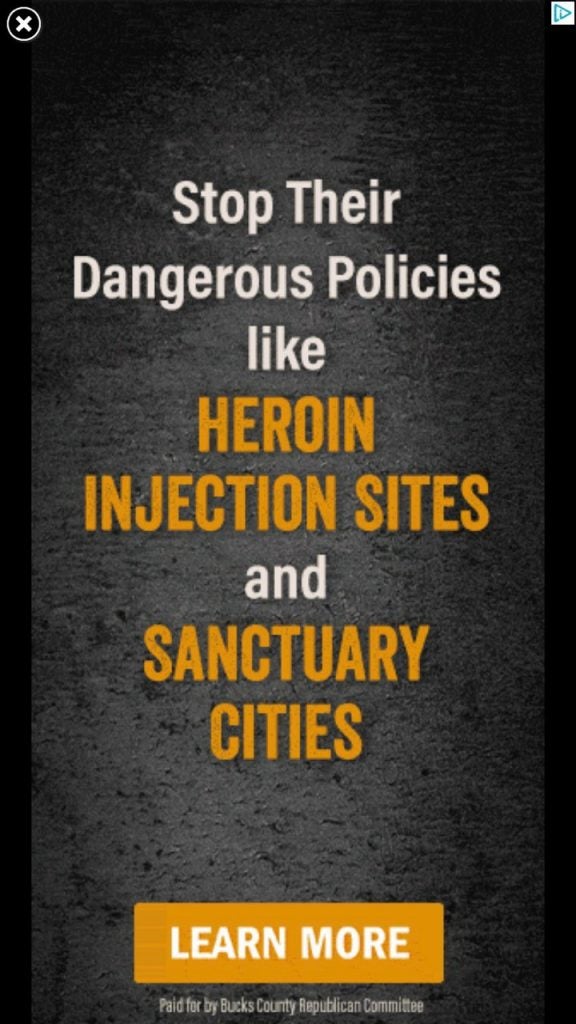
Insite, Vancouver's supervised injection facility, provides people with clean injection supplies.
Elana Gordon / WHYY

Insite, Vancouver's supervised injection facility, provides people with clean injection supplies.
Elana Gordon / WHYY

Elana Gordon / WHYY
Insite, Vancouver's supervised injection facility, provides people with clean injection supplies.
Republican candidates in suburban Philadelphia’s counties have promised they won’t allow a supervised injection site — like the one proposed in Philadelphia — to come there.
The only problem? No one has proposed opening one.
From mailers in Montgomery County, to debates in Delaware County, to letters and social media messages in Bucks, the issue of supervised injection sites has made its way into local campaigns, even as the status of Safehouse’s proposed Kensington site is tied up in legal challenges by the U.S. Justice Department.

(Pennsylvania Republican Party mailer)
Fred Conner, a Republican who is running for county commissioner in Montgomery County, recently sent a mailer staking out his position on injection sites locating there. He said he knows nothing has been proposed, but he wanted to get ahead of the issue.
“We here in suburban Philadelphia and particularly Montgomery County are often the recipients of other ideas or initiatives that come out of the city of Philadelphia,” Conner said. “I thought it was important to be very clear on this issue that I think supervised injection sites are a bad idea.”
Kelly Colvin, a Republican candidate for Delaware County Council, cautioned against supervised injection sites during a debate last week at the Maris Grove retirement community.
She and her slate mates, Mike Morgan and James Raith, recently went on a fact-finding visit to Kensington to learn more about the opioid crisis there. They met with Pastor Juan Marrero at the Crossroads Community Center and spoke with him to learn more about the impact of opioid addiction on the neighborhood.
“We hear about these safe injection sites and the movement to create that in the city of Philadelphia, and we wanted to understand the culture there and what was going on, and the Philadelphia policies that are allowing that to happen,” Colvin said at the debate, “because we don’t want that here in Delaware County.”
In a follow-up interview, when asked why this was a focus when no site has been proposed in Delaware County, Colvin said she sees the issue on the horizon.
“If it is ultimately approved in Philadelphia, I do see it crossing over into Delaware County as well as a policy,” she said, “and I just don’t think it’s the right thing in general, and certainly not for our communities here.”
The Bucks County Republican Committee has posted on social media and sent out flyers that say, “Neighboring Philadelphia has adopted supervised injection sites enabling the use of heroin and other illegal drugs. Please vote Republican this November to prevent this from happening in our community.”

(Bucks County Republican Party mailer)
But Safehouse, Philadelphia’s proposed site, could be far from opening, and none of the Democratic candidates in suburban counties have proposed a supervised injection site.
“This is not something we’re interested in bringing to Delaware County, and that’s why we haven’t proposed it in any way, shape or form,” said Monica Taylor, a Democratic candidate for Delaware County Council.
Bringing up the topic “is wrong, and it’s kind of shameful,” Taylor said. “No one has even mentioned safe injection sites except for the Republican candidates.”
Teresa Harris, public affairs manager for the Montgomery County Board of Commissioners, confirmed the matter has been a non-issue.
“There have been no discussions or proposals for a safe injection site in Montgomery County,” Harris said.
Diane Ellis-Marseglia, Democratic commissioner in Bucks County, called the attempt by Republicans to insert supervised injection sites into the suburban conversation “disgusting.”
“I am aghast at this,” Ellis-Marseglia said, noting that she would not support such a site in Bucks, nor has she or her fellow Democrats ever talked about opening a supervised injection site in the county. “The Republicans are using this as an election ploy.”
Documents obtained by WHYY show the Bucks County Republican Committee has been sending out letters to residents since October 2018 that read, “Philadelphia Heroin Injection Sites could be coming anywhere in Bucks County.”
Scott Burris, director of the Center for Public Health Law Research at Temple University, said that aside from the political machinations, any discussion of supervised injection sites in the suburbs is exceedingly premature.
“We’re a long way from Safehouse even opening, let alone having a serious discussion of where else they might be needed,” he said.
Supervised injection sites have been most useful among people with long-term, chronic substance abuse disorder, he said — in places where there are high rates of homelessness and a population of people without access to health services who have repeatedly tried and failed to enter recovery.
“You have to make sure you have a concentration of people who would use the site and who would benefit from the services,” Burris said.
That isn’t to say substance abuse isn’t an issue in the suburbs, he said. But he surmised that other interventions would be more successful there, and that only a comprehensive study of the communities and their needs could identify what would make the most sense there.
Ellis-Marseglia said Bucks County has made treatment and detox services available for residents who need them and will continue to do so, but that supervised injection has never been a part of the conversation.
“There’s no need for that here,” she said.
WHYY is the leading public media station serving the Philadelphia region, including Delaware, South Jersey and Pennsylvania. This story originally appeared on WHYY.org.

A collection of interviews, photos, and music videos, featuring local musicians who have stopped by the WITF performance studio to share a little discussion and sound. Produced by WITF’s Joe Ulrich.
The days of journalism’s one-way street of simply producing stories for the public have long been over. Now, it’s time to find better ways to interact with you and ensure we meet your high standards of what a credible media organization should be.